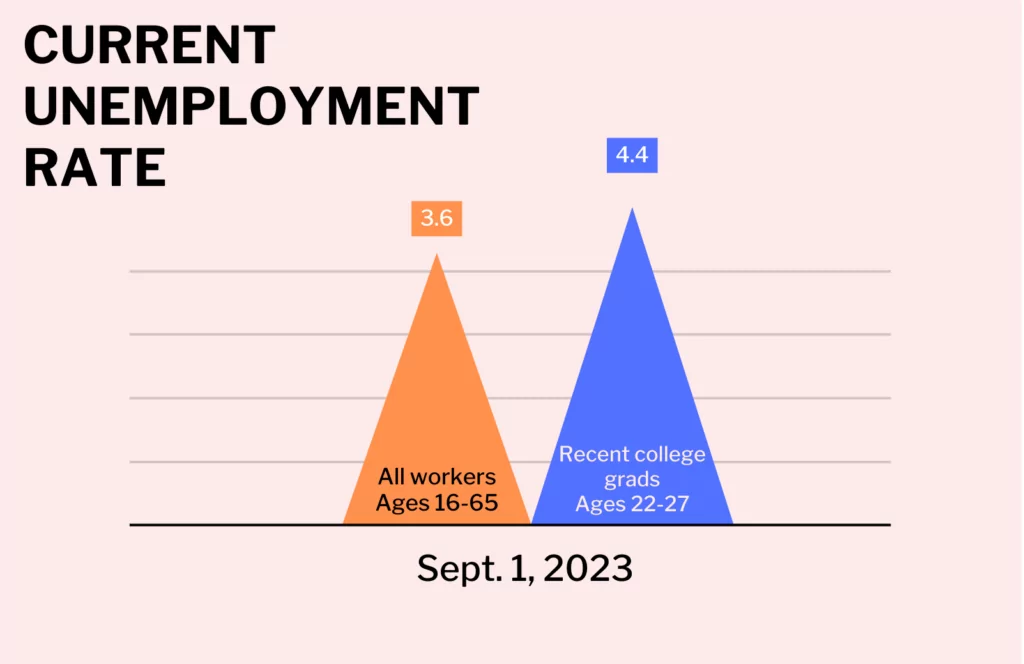According to the recent finds presented by The Washington Post, the current job market shows a unique challenge for new college graduates, who are experiencing higher unemployment rates than the general population. This marks a significant shift from previous trends where a college degree often assured better employment prospects.

✅ AI Essay Writer ✅ AI Detector ✅ Plagchecker ✅ Paraphraser
✅ Summarizer ✅ Citation Generator
Key Takeaways
- Recent college graduates are facing an unemployment rate of 4.4%, which is higher than the overall rate and nearly double that of all workers with a college degree.
- Many graduates are not interested in industries with worker shortages like hospitality or care services. Furthermore, about 40% of recent graduates are underemployed, working in jobs that don’t require a college degree.
- This employment struggle is leading to political discontent and economic disillusionment among young adults.
Historically, a college degree was a near guarantee for better employment prospects. However, since the pandemic, there’s been a noticeable shift. The latest figures are startling: the unemployment rate for recent graduates stands at 4.4%, surpassing the overall national rate and nearly doubling the rate for all workers holding a college degree.

As Lucas Chung, a recent graduate, expresses his frustration with the current market, “I had high hopes but it’s not really working out for me,” the reality of the situation becomes evident. Despite his impressive academic and extracurricular credentials, Chung has faced a series of rejections in his job search.
Harry Holzer, a public policy professor at Georgetown University, notes,
“Recent college graduates are very sensitive to the state of the labor market.”
Many industries where graduates aim to work, like tech and finance, are scaling back on hiring or laying off staff. This contrasts sharply with the high demand in sectors less appealing to graduates.
Impact on Life and Career Plans
The situation has significant impacts on the life plans of these graduates. Many, like Christian Torres, a recent electrical engineering graduate, find themselves in a limbo, unable to secure relevant employment. The result is a higher rate of young adults living with their parents and rethinking their independence.
A significant factor in this trend is the mismatch between graduates’ career aspirations and the sectors experiencing labor shortages. Industries such as hospitality, childcare, and nursing homes, desperate for workers, are often overlooked by graduates seeking roles in tech, finance, and media. This mismatch is contributing to a rise in underemployment, with about 40% of recent graduates working in roles that do not require a college degree, compared to a steady 33% among all college graduates. Kory Kantenga, a senior economist at LinkedIn, suggests that the job market has been favorable for non-degree holders in sectors like leisure, hospitality, and manufacturing. The issue isn’t just graduate unemployment but a shift in the job market dynamics.
Employer engagement at campus job fairs remains high, but actual hiring is slowing down, especially in popular sectors like tech and consulting. This slowdown is a source of growing frustration among graduates, as noted by Suzanne Helbig from the University of California Irvine’s Division of Career Pathways. Graduates find it increasingly challenging to land interviews, and fewer are walking away with job offers.
Adapting to a Changing Economy
The changing economic landscape, influenced by factors like the Federal Reserve’s interest rate hikes, has impacted industries that traditionally attracted college graduates. Julia Pollak from ZipRecruiter points out the heightened caution among companies in tech and banking, leading to reduced opportunities for less-experienced workers.
Students’ Perspectives
Two students, Kyle Ciambrone and Amber shared their own stories to paint a vivid picture of the current job market’s harsh reality. Kyle, a bright-eyed graduate from Monmouth University with a degree in marketing, shared with me his journey that deviated far from his expectations. Post-graduation, instead of stepping into the corporate world, he found himself delivering pizzas and working in a warehouse. His relentless job applications, reaching up to 50 a week, have yet to yield a stable office job.
“I always just expected that you’d go to school, get your degree, and land a decent office job.”
Amber’s story is equally compelling. Graduating with a physics degree, she envisioned a career brimming with opportunities. Instead, she faced the daunting reality of a $10-an-hour job at a call center, a role far removed from her field of study. Facing harassment and job dissatisfaction, Amber left, only to find herself in a relentless cycle of job applications and rejections. Her struggle to find a job in engineering, customer service, or IT continues, underscoring a challenging job market that seems unyielding to her qualifications and aspirations.
Conclusion: Adapting to New Realities
Following such a huge shift, graduates like Lucas Chung are now forced to adapt to the unprecedented challenges. Lucas, a St. Mary’s College graduate with an outstanding academic record, faced a series of rejections that led him to reconsider his career path entirely. With resilience and a pragmatic approach, he is now gearing up for law school, a decision born out of necessity rather than preference. This shift in strategy is not just Lucas’s story but echoes the experiences of many other graduates. They are a testament to the adaptability and resilience required to navigate a current job market that has drastically changed from what was once a predictable pathway to success.
Follow us on Reddit for more insights and updates.





Comments (0)
Welcome to A*Help comments!
We’re all about debate and discussion at A*Help.
We value the diverse opinions of users, so you may find points of view that you don’t agree with. And that’s cool. However, there are certain things we’re not OK with: attempts to manipulate our data in any way, for example, or the posting of discriminative, offensive, hateful, or disparaging material.